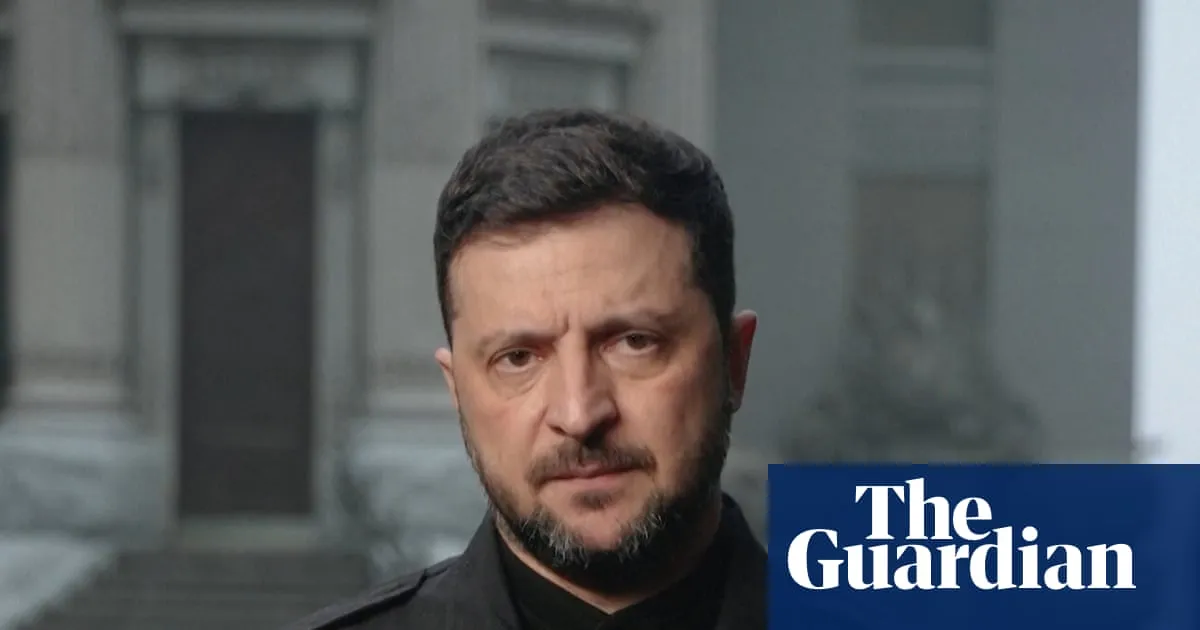
Ukrainian President Volodymyr Zelenskyy has declared that Ukraine is confronting one of the most challenging moments in its history. This statement comes in the wake of Donald Trump demanding that Kyiv accept a US-backed “peace plan” within a matter of days. This proposal would compel Ukraine to cede territory to Russia and make other significant concessions that many officials view as tantamount to a “capitulation.”
On Friday morning, Trump confirmed that next Thursday—coinciding with Thanksgiving in the US—would be an “acceptable” deadline for Zelenskyy to endorse the controversial deal. European and Ukrainian officials have expressed concerns that this timeline poses immense pressure on Ukraine, forcing it to choose between maintaining its national dignity and jeopardizing its relationship with a US administration seemingly eager to conclude the conflict on Moscow’s harsh terms.
In a poignant 10-minute address delivered outside his presidential palace, Zelenskyy articulated the dire situation, stating that Ukraine faces an impossible choice. He emphasized the gravity of the circumstances: “Now the pressure on Ukraine is one of the heaviest,” he remarked. The options presented to Ukraine include agreeing to Trump’s 28-point proposal or facing “an extremely difficult winter,” exacerbated by Russia's destruction of much of Ukraine's energy infrastructure, leaving millions without heating and electricity.
Zelenskyy expressed profound concerns regarding the implications of agreeing to the US-Russian plan, suggesting it could lead Ukraine to a state “without freedom, dignity, and justice.” He highlighted the risks involved in trusting “someone who has already attacked us twice,” stating his unwavering commitment to protect Ukraine’s interests and uphold its constitution. “We did not betray Ukraine then in 2022, and we will not do so now,” he asserted.
During an interview on Fox radio, Trump reiterated his belief that the deadline was appropriate for Zelenskyy to sign the agreement, asserting that Ukraine could not successfully fend off the Russian army's advances in the Donbas region. US officials have indicated that the Biden administration is pursuing an “aggressive timeline” to end the ongoing conflict, which could result in unprecedented pressure on Kyiv to acquiesce.
In response to Trump’s proposal, European leaders have voiced their opposition. Ukrainian politicians have labeled the 28-point plan as “absurd,” as it includes stipulations for Ukraine to relinquish control over parts of the eastern Donbas region and reduce its military capacity. Notably, the plan excludes the option for European peacekeepers and demands that Ukraine forgo long-range weaponry and refrain from joining NATO.
On the same day, Zelenskyy engaged in a telephone conversation with US Vice President JD Vance, who has previously urged Ukraine to negotiate a swift end to the war. Following their hour-long discussion, Zelenskyy provided a cautious statement, noting that they had navigated many details of the American proposals for ending the war and were working towards a dignified path to lasting peace.
Western allies, including French President Emmanuel Macron, German Chancellor Friedrich Merz, and British leader Keir Starmer, expressed solidarity with Zelenskyy. They reaffirmed their support for Ukraine, emphasizing that any agreement to cease hostilities must be genuinely fair and respect Ukraine's defined red lines. They insisted that the current line of contact should serve as the starting point for any territorial discussions.
The EU’s foreign policy chief, Kaja Kallas, cautioned that a peace deal rewarding Russia’s aggression could set a perilous global precedent. “If you just give in to the aggression, then you invite more aggression,” she warned, highlighting the potential for other nations to develop territorial ambitions similar to Russia's.
In his address, Zelenskyy honored the resilience of Ukrainians who have endured “almost four years of full-scale invasion.” He acknowledged that, despite the nation’s strength, compromises might be necessary to achieve peace. “Our people really, really want this war to end. We are, of course, strong, but even the strongest metal can break. Don’t forget that,” he cautioned.
Zelenskyy conveyed his intention to work calmly and constructively with Washington regarding its peace plan, aiming to propose alternatives. The plan was reportedly drafted by Kirill Dmitriev, an envoy for Vladimir Putin, and Steve Witkoff, Trump’s special representative, during a meeting in Miami that excluded European and Ukrainian officials from the discussions.
While Zelenskyy has been under immense pressure at home due to a corruption scandal involving former associates, Ukrainian government insiders believe relations with Washington have improved since February, when Trump and Vance publicly criticized Zelenskyy. However, Kyiv now faces the daunting prospect of provoking Trump’s ire if it does not swiftly accept the proposed deal.
As the negotiations continue, the stakes remain high for Ukraine. The potential repercussions of yielding to pressure from Moscow could be detrimental to Ukraine’s sovereignty. Zelenskyy remains committed to ensuring that Ukraine’s national interests are upheld while navigating the complexities of international diplomacy.
With a delegation of senior US military officials recently engaging with Zelenskyy and plans for American generals to discuss the peace proposal with the Kremlin, the unfolding situation remains critical. The international community watches closely, aware that the decisions made in the coming days could shape the future of Ukraine and its fight for independence.